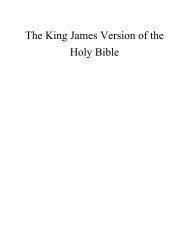Free End Times Book (pdf).. - Rapture Notes
Free End Times Book (pdf).. - Rapture Notes
Free End Times Book (pdf).. - Rapture Notes
You also want an ePaper? Increase the reach of your titles
YUMPU automatically turns print PDFs into web optimized ePapers that Google loves.
they hid from Him, the Lord found them and offered a way back, a way of restoration. That restoration involved<br />
wearing the skins of an animal sacrifice. An animal sacrificed by God Himself was the first creature to die. The<br />
death of the animal was symbolic of the physical death they deserved to die. It demonstrated a great principle of<br />
Scripture that "without the shedding of blood there is no remission (removal) of sin." The concept of a<br />
substitutionary atoning sacrifice was introduced. Before they received this gift from God, they were in a state of<br />
being spiritually dead--cut off from Him. But when they received it and wore it, they were in effect confessing their<br />
sin and their inability to solve the problem for themselves. The death of that first animal on their behalf became a<br />
"covering" for their sin (Genesis 3:21). Fig leaves and other forms of clothing would come to be symbols of man's<br />
self-righteousness. Sin causes man to lose his own righteousness as the prophets tell us, "All of us have become like<br />
one who is unclean, and all our righteous acts are like filthy rags." (Isaiah 64:6) This would later be the basis for the<br />
institution of the system of animal sacrifices. sacrifices and would teach us about "imputed righteousness"--that<br />
inherent goodness of Christ with which we are clothed when we place our faith in Him. And the animal sacrifices, in<br />
turn, point to a future final sacrifice by the Messiah. That is why Paul continued the explanation in Ephesians this<br />
way:<br />
But because of his great love for us, God, who is rich in mercy, made us alive with Christ even when we were dead<br />
in transgressions--it is by grace you have been saved. (Ephesians 2:4-5) The next few chapters of Genesis trace the<br />
spread of the human race and its eventual corruption--within less than 2000 years--to the point that God needed to<br />
send a flood to destroy the evil. Again, He did not destroy the entire planet, but, in love and grace, God preserved<br />
the eight persons who still trusted in Him. Therefore, Noah and his family were saved (Genesis 6-10).<br />
After the Flood, God told men to "be fruitful and increase in number and fill the earth." (Genesis 9:1) This would<br />
require them to gradually migrate in all directions. Those who were migrating East built a city and a tower at<br />
Babylon, and established there false religious system in an effort to disobey God and stay together. God confused<br />
their languages so they could no longer work together. (Genesis 11)<br />
Chosen to Share the Truth<br />
Several hundred years later people had established cultures in many places. There were some who still retained the<br />
truth passed down to them by their fathers from the time of Noah, but there were many who had abandoned that<br />
truth. God picked out one man, from the city of Ur of the Chaldees, a place where most people no longer believed in<br />
Him. He called Abram (later called Abraham) with these words:<br />
The LORD had said to Abram, "Leave your country, your people and your father's household and go to the<br />
land I will show you. "I will make you into a great nation and I will bless you; I will make your name great, and<br />
you will be a blessing. I will bless those who bless you, and whoever curses you I will curse; and all peoples on<br />
earth will be blessed through you." (Genesis 12:1-2)<br />
The Covenants<br />
God does not act whimsically or arbitrarily, but deals with individuals and nations on the basis of great contracts or<br />
covenants which He Himself initiates. The very name Yahweh is known as the "covenant name" of God. Yahweh is<br />
related to the Hebrew verb "to be" and indicates that God is a living Person who enters into personal relationships<br />
with individuals and with groups of individuals. Everything God has done in regards to our salvation is based on one<br />
or more of the covenants God has made in the past. None of these has been abrogated or annulled.<br />
Even before Abraham's time God had made a covenant with Noah on behalf of the whole human race. That<br />
covenant was a promise never again to destroy the earth with a flood. (Genesis 9:8-17)<br />
There are groups of churches today which stress what they call "convenantal theology." We do not disagree with this<br />
emphasis on the ways God has chosen to enter into contracts with His peoples. However many of the "covenant<br />
churches" would not necessarily agree with our eschatology. The subject of covenants in the Bible is important and<br />
complex. The Appendix introduces this subject for the serious student.<br />
Thy Kingdom Come, Thy Will be Done… 9



